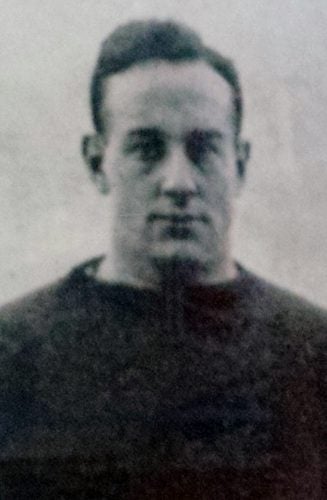- Captain
- WW I
Biography
Albert “Joe” Alphonse LeBoeuf was born on 20 June 1894 in Fall River, Massachusetts. He was the youngest of eight children born to Francois and Elizabeth LeBoeuf. He was an accomplished graduate of Durfee High School in Fall River where he was a member of Delta Gamma Sigma fraternity, and he distinguished himself in football, basketball and track.
Joe entered Rhode Island State College in 1913 majoring in Applied Science. He was a member of Theta Chi fraternity. Joe earned eight varsity letters in baseball and football. He was the Captain of both teams, as well as a star passer, runner and punter on the gridiron, playing both quarterback and running back. A natural leader, he was secretary of his senior class and a Cadet Lieutenant in Rhode Island State College’s Army ROTC Battalion. Joe was inducted with the initial class into the University of Rhode Island’s Athletic Hall of Fame in 1959. The prestigious “LeBoeuf Award,” given annually to the University of Rhode Island’s best senior male athlete, is named in his honor. Joe graduated in 1917 with a Bachelor of Science Degree in Applied Science and was commissioned a Second Lieutenant, United States Marine Corps.
In July 1917, Second Lieutenant LeBoeuf attended the US Marine Corps Officer Training Course at Quantico, Virginia; and in April 1918, after the United States entered World War I, First Lieutenant LeBoeuf deployed to France with the 2d Marine Division, American Expeditionary Force.
First Lieutenant LeBoeuf was involved in combat operations throughout his assignment as an infantry platoon leader. He was severely wounded in October 1918 while involved in fighting during the Meuse-Argonne Offensive and the Battle of the Argonne Forest which was a part of the final Allied offensive of World War I that stretched along the entire Western Front. It was fought from 26 September 1918 until the Armistice on 11 November 1918, a total of 47 days. The battle was the largest in United States military history involving 1.2 million American soldiers. The Meuse-Argonne offensive was the principal engagement of the American Expeditionary Forces during the First World War. The United States lost 26,277 men, and 95,786 were wounded in action.
After the war, Captain LeBoeuf served as the Assistant Provost Marshall in Paris. As a result of his wounds, his leg had to be amputated; and he was medically retired in the grade of Captain from the United States Marine Corps in December 1919. Joe then returned to his hometown of Fall River, Massachusetts. He returned to France in August 1922 to study for a time at the Paris-Sorbonne University, the most distinguished theological institution in France.
In 1924, Joe and his wife Mary moved to Brooklyn, New York where he was employed as a statistician on the staff of J.P. Morgan Company until his untimely death on 6 December 1939. Captain Albert Alphonse LeBoeuf, USMC, died suddenly from apoplexy.
Joe’s funeral was held in Fall River, Massachusetts with a funeral mass in St. Mathieu’s French-Canadian Catholic Church and Interment with full military honors at Notre Dame Cemetery, Fall River, Massachusetts. As many of his fellow students at Rhode Island State College, Captain Joe LeBoeuf answered the call to serve his country during the “Great War.” He is a true hero who was severely wounded leading his soldiers against the enemy.
Education
1917

